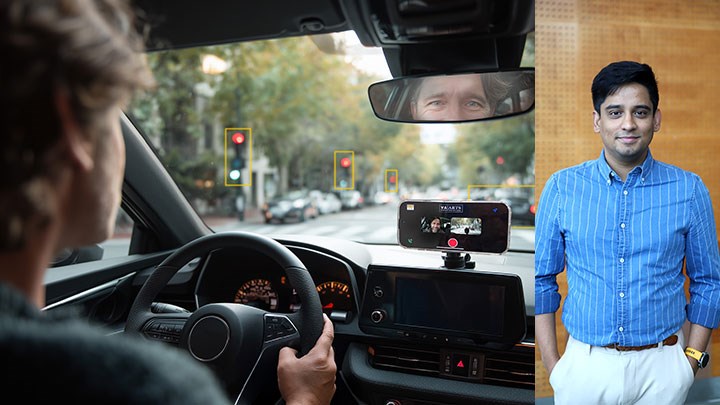Örebro startup joins Spotify and Volvo Cars on prestigious Times list

QTPIE has developed an automated driving test system. Ravi Teja Chadalavada is the innovator and CEO of the company.
Using robotics, computer vision and AI, startup QTPIE has developed the world’s first automated driving test system. Now QTPIE, founded by a team of Örebro researchers led by Ravi Chadalavada, has made it onto the prestigious Times Best Inventions 2025 list – joining previous honourees Spotify, Volvo Cars and Einride.
Swedish companies on Time Magazine’s Best Inventions List:
- 2025 – QT-PIE
- 2024 – Volvo Cars
- 2023 – Spotify och BioArctic/Eisai
- 2021 – Einride
- 2020 – Renewcell
- 2016 – Better Shelter/Ikea Foundation
Today, Time Magazine presents its annual Best Inventions 2025 list. The magazine aims to recognise the year’s most groundbreaking innovations that are shaping the future. Selection is made by reviewing and evaluating each innovation based on factors such as originality, effectiveness, ambition and social impact.
Swedish companies previously on the list include Spotify, Volvo Cars, Einride, Teenage Engineering and Renewcell.
“An incredible honour”
TIME's 2025 list includes QTPIE, a Swedish startup born out of research at Örebro University, which is developing the next generation of driving licence tests and driver assessment. According to Time, QTPIE’s automated driving test platform was selected for its “transformative impact on road safety and the digital management of driving licence issuance – in line with Sweden’s Vision Zero, the goal of eliminating traffic-related deaths and serious injuries”.
“Being recognised by Time is an incredible honour and a strong affirmation of our mission to improve road safety through automated driving tests and monitoring systems,” says Ravi Teja Chadalavada, innovator and CEO of QTPIE, and continues:
“We are pleased to share this success with our partners at the Virginia Department of Motor Vehicles (DMV), whose vision and commitment to road safety has been instrumental.”
Passing your driving test – without a human inspector in the car
QTPIE’s driving test platform – the Automated Road Test System (ARTS) – uses robotics, computer vision and AI to fully automate driving tests, without the need for a human inspector in the vehicle.
This makes testing safer for employees, who no longer have to ride with unfamiliar drivers – a practice that has led to injuries and fatalities in the past. The system also increases efficiency by allowing the DMV employee to work from the office while the tests are conducted autonomously. This reduces long waiting times for driving licence applicants.
“We have basically condensed the self-driving car into a smartphone app. Our goal is not to replace the human inspector, but to bring consistency and data-driven objectivity – moving us closer to the Vision Zero goal of safer roads for all,” says Ravi Teja Chadalavada.
After an 18-month pilot with the Virginia Department of Motor Vehicles (DMV), the system demonstrated 97% agreement with human inspectors and zero false negatives. A major success for QT-PIE, which is now preparing for a rollout at ten of Virginia’s largest DMV centres in early 2026, followed by another 30 centres later that year – and a statewide rollout in 2027.
Collaboration with Trafikverket and RISE in Sweden
Meanwhile, QTPIE is working with the Swedish Transport Administration (Trafikverket) and RISE Research Institutes of Sweden to integrate the technology into the Swedish driving licence system. Interest is also growing in the rest of the U.S., where 24 states are considering pilot projects next year.
“At QTPIE, we see the future of driving testing as moving from a single high-risk situation to a long-term, data-driven model of driving licence proficiency. Instead of making decisions based on a few minutes of performance, the platform will be able to track driver behaviour over weeks or months and recommend a licence when consistent safe behaviour can be established,” says Ravi Teja Chadalavada, adding:
“Our goal is to become the universal standard for driving licence assessment – integrating our software directly into automakers’ vehicles to make roads safer worldwide. The vision also includes future integration with insurers, healthcare providers and commercial vehicle fleets, opening up new opportunities for dynamic risk modelling.”
QTPIE was founded in 2023
QTPIE is a spin-off from the Centre for Applied Autonomous Sensor Systems (AASS) at Örebro University. The company was founded in 2023 by Ravi Chadalavada, then a PhD student at Örebro University and a graduate of MIT and Chalmers, together with a team consisting of Professor Achim Lilienthal, Professor Maike Schindler, Senior Lecturer Henrik Andreasson and Sai Krishna – renowned researchers in robotics, AI, computer vision and eye tracking from TU Munich, University of Cologne and Örebro University.
The research has been funded by research grants from the EU, the Knowledge Foundation, the Swedish Transport Administration and the European Regional Development Fund (AI.ALL). The company has also received support from the Innovation Office at Örebro University, Vinnova, IVA and Swedish actors in the innovation ecosystem such as Sting, Inkubera and Region Örebro County.
Growth has been funded primarily through early revenues from paid pilots and investments from a select group of prominent angel investors.
Text: Jesper Eriksson
Photo: Anna Lorentzon and Brad Borkowski (Virginia DMV)
Translation: Jerry Gray/Charlotta Hambre-Knight
